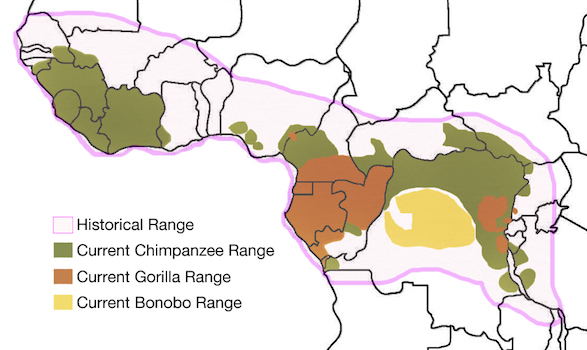Advocacy:
Free-Living African Apes
- Free-living chimpanzees are facing extinction. The population of wild chimpanzees has decreased at an alarming rate in the last century.
- See the Primate Specialist Group of IUCN’s Species Survival Commission for proposed Action Plans for conserving each of the four subspecies of chimpanzees: Pan troglodytes verus (Western chimpanzee), P. t. ellioti (Nigeria-Cameroon chimpanzee, previously known as P. t. vellerosus), P. t. troglodytes (Central chimpanzee), and P. t. schweinfurthii (Eastern chimpanzee) as well as other endangered primates.
- The African rainforest logging industry has fueled rapid population decline of wild chimpanzees. Valuable African woods such as teak and mahogany are taken from the deepest parts of the once dense rainforests, home to thousands of species of flora and fauna.
- Habitat loss has also allowed for easy access for hunters of the illegal bushmeat trade. Chimpanzee meat is sold on the black market, and hunters make a large profit on this completely unsustainable practice. Bushmeat is eaten both locally and it is exported to other countries and sold on the black market for a high prices.
- When female chimpanzees reach sexual maturity, they leave the group they were born into to mate with males from different communities. Habitat loss due to the logging industry has made it hard for females to travel, and genetic diversity has dramatically declined in the last century.
- Coltan, a product used in LCD screens, (for products such as cell phones, cameras, and laptops), is mined from central Africa. Coltan mining has impacts on habitat loss and African ape populations similar to the African rainforest logging industry.
- The other African apes are as equally endangered as chimpanzees. Learn more about gorillas and bonobos.
- Be a conscious consumer to help the African apes. Avoid purchasing African woods such as teak and mahogany, or buy antiques. Recycle any products with LCD screens. Be the voice for these endangered species and spread the word!





